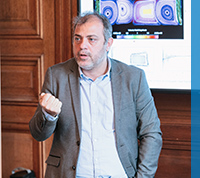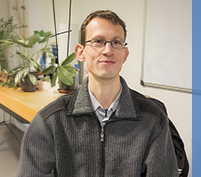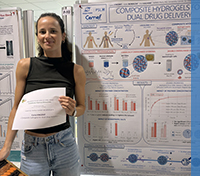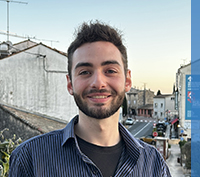PhD defence of Joël Keumo Tematio
Joël Keumo Tematio defends his PhD in Computational Mechanics and Materials on Oct. 27, 22.
Efficient thermomechanical model of DED process by inherent strain method

Joël Keumo Tematio conducted his PhD work in the 2MS team under the supervision of Michel Bellet and Yancheng Zhang. He defends his PhD in "Computational Mechanics and Materials" on October 27th, 2022 in front of the following jury:
Abstract:
A thermo-mechanical finite element simulation is developed for additive manufacturing by directed energy deposition (DED). The simulation is conducted at the scale of the part, by modelling the progressive deposition of matter and the energy source. A general expression of the consistent tangent modulus is derived and implemented in the finite element resolution, considering an elastic-viscoplastic behavior with both isotropic and non-linear kinematic hardening. To incrementally resolve the displacement, strain and stress fields, a theoretical formulation for the kinematic positioning is proposed to minimize the distortion of the non-constructed fraction by considering current displacement and strain in the constructed part. The convergence analysis of the developed simulation is verified by both temporal and spatial aspects. The validation is obtained by comparison with experimental results taken from the literature for the cases of a straight vertical wall and a turbine blade showing a strong curvature. To reduce the computational time, an incremental inherent strain method is first proposed, where the inherent strain is determined by an inverse method based on simulation results from the standard elastic-viscoplastic calculation applied to a few tracks. However, when applying this inherent strain in the case of a simulation of entire parts, the results are severely degraded with respect to the reference solution given by the standard simulation. This is confirmed, whatever the method to apply inherent strains: uniform, or spatially distributed in each new layer. Especially the results become worse for the highly curved turbine blade structure. To resolve such problems, a new "inherent strain rate" method is proposed, consisting of a linearization of the progressive calculation. This is obtained by considering the scalar equivalent viscoplastic strain rate as the inherent strain rate. During the process simulation, the inherent strain rate-based calculation is combined with the standard calculation which is kept to simulate the ends of each track. Thanks to this combination, and to a continuous updating of the inherent strain rate, perfect results are obtained for both the single wall and the turbine blade, with a time gain of 5. This makes the proposed inherent strain rate method very promising for additive manufacturing process simulation.
Keywords: Additive manufacturing, Numerical simulation, Finite element, Inherent strain, Inherent strain rate








